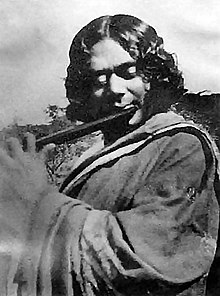Kazi Nazrul Islam
| Kazi Nazrul Islam | |
|---|---|

Nazrul in Chittagong, 1926
|
|
| Born |
24 May 1899 Churulia, Bengal Presidency, British Raj |
| Died | 29 August 1976 (aged 77) Dhaka, Bangladesh |
| Resting place | Dhaka University |
| Occupation |
|
| Language | |
| Nationality | Bangladeshi |
| Ethnicity | Bengali |
| Period | 1922–1964 |
| Notable works |
|
| Notable awards | |
| Spouse | Pramila Devi |
|
|
|
| Signature | |
Kazi Nazrul Islam (Bengali: কাজী নজরুল ইসলাম, pronounced: [kadʒi nodʒrul islam]) (24 May 1899 – 29 August 1976) was a Bengali poet, writer, musician, and revolutionary. He is the national poet of Bangladesh. Popularly known as Nazrul, he produced a large body of poetry and music with themes that included religious devotion and spiritual rebellion against fascism and oppression. Nazrul's activism for political and social justice earned him the title of "Rebel Poet" (Bengali: বিদ্রোহী কবি; Bidrohi Kobi). His compositions form the avant-garde genre of Nazrul Sangeet (Music of Nazrul). The same genre is also known as Nazrul Geeti (Music of Nazrul) in India. In addition to being revered in Bangladesh, he is equally commemorated and revered in India, especially in the Bengali Speaking states of West Bengal and Tripura.
Born in a Bengali Muslim Kazi family, Nazrul Islam received religious education and as a young man worked as a muezzin at a local mosque. He learned about poetry, drama, and literature while working with the rural theatrical group Letor Dal. He joined the British Indian Army in 1917. After serving in the British Indian Army in the Middle East (Mesopotamian campaign) during World War I, Nazrul established himself as a journalist in Calcutta. He assailed the British Raj in India and preached revolution through his poetic works, such as Bidrohi (The Rebel) and Bhangar Gaan (The Song of Destruction), as well as his publication Dhumketu (The Comet). His nationalist activism in Indian independence movement led to his frequent imprisonment by the colonial British authorities. While in prison, Nazrul wrote the Rajbandir Jabanbandi (Deposition of a Political Prisoner). Exploring the life and conditions of the downtrodden masses of the Indian subcontinent, Nazrul worked for their emancipation. His writings greatly inspired Bengalis of East Pakistan during the Bangladesh Liberation War. Bangladeshi literary critic Azfar Hussain characterized Kazi Nazrul Islam as one of the greatest revolutionary poets in the world.
...
Wikipedia
